Save the Date!
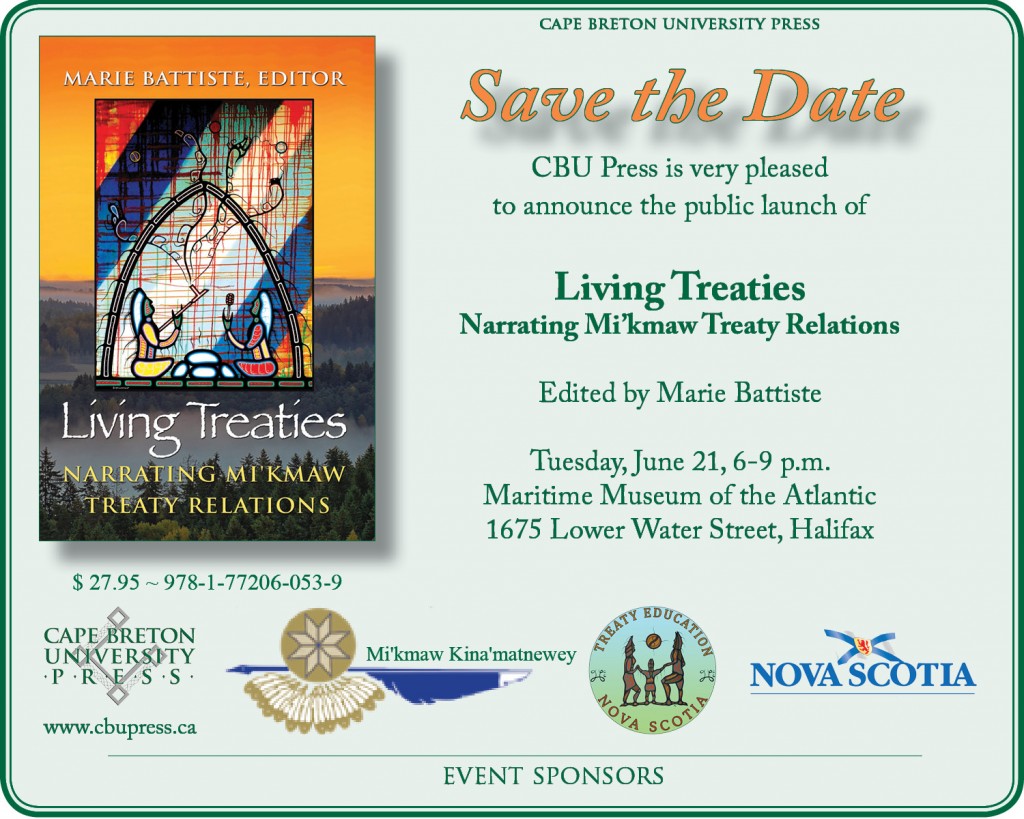
p.s. This could be the most important book you read this year.
p.s. This could be the most important book you read this year.

p.s. This could be the most important book you read this year.
p.s. This could be the most important book you read this year.
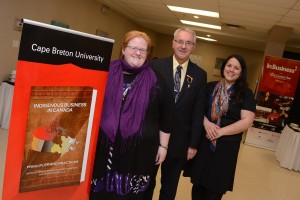 We’re sharing a few photos from the May 17 launch of Indigenous Business in Canada: Principles and Practices at the Membertou Trade and Convention Centre. It was quite the event.
We’re sharing a few photos from the May 17 launch of Indigenous Business in Canada: Principles and Practices at the Membertou Trade and Convention Centre. It was quite the event.
Emcee Keith Brown, co-editor of the book and holder of the Purdy Crawford Chair of Aboriginal Business Studies, was joined by a number of excellent speakers, including Sr. Dorothy Moore, a Mi’kmaw Elder and scholar who was instrumental in creation of the Mi’kmaw studies program at CBU nearly twenty years ago. That program has grown into something substantial with the creation of Unama’ki College under Dean Stephen Augustine.
Describing the book’s genesis, Keith Brown said “In 2012 we reached out to dozens of Aboriginal post-secondary students from 19 universities in nine provinces in a series of roundtables. The students told us they did not exist in any textbook or case.”
“They were, in fact, invisible to anyone who studied business in Canada. The driving force behind this book was to give voice to these students and all future students about the realities of Aboriginal business in Canada.”
Indigenous Business in Canada addresses contemporary concerns and issues in the practice of Aboriginal business in Canada, reveals some of the challenges and diverse approaches to business in Indigenous contexts from coast to coast to coast, and demonstrates the direct impact that history and policy, past and present, have on business and business education.
The Chair, and its initiatives also received a boast from RBC on this occasion – a $ 500,000 contribution!
News of the book was picked up by a variety of media, including the Cape Breton Post, Information Morning on CBC Radio One Cape Breton and NationTalk. More to come, no doubt.
Photos by Vaughan Merchant, courtesy the Purdy Crawford Chair in Aboriginal Business Studies.
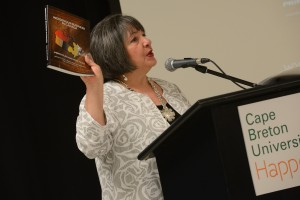



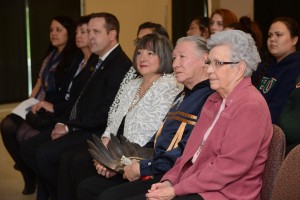
We’re sharing a few photos from the May 17 launch of Indigenous Business in Canada: Principles and Practices at the… Continue»
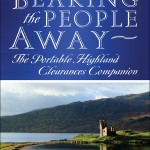 Delighted that the journal Ethnologies is getting caught up with book reviews this month (Ethnologies 36 (1-2)), because three CBUP books are included: French Taste in Atlantic Canada, Celtic Threads and Bearing the People Away
Delighted that the journal Ethnologies is getting caught up with book reviews this month (Ethnologies 36 (1-2)), because three CBUP books are included: French Taste in Atlantic Canada, Celtic Threads and Bearing the People Away
Of Bearing the People Away: The Portable Highland Clearances Companion, by June Skinners Sawyers (CBUP 2013), the reviewer writes:
“Bearing the People Away is a fascinating read, with a wealth of information. It serves as a significant resource for the focussed study of the Highland Clearances and, at the same time, an introduction to the general story of the Clearances. Historians and casual readers will find plenty to interest them.
“Throughout the volume, the tone is even-handed and almost understated, making the information contained even more chilling when presented in prose of such restraint. “Part of the charm of the book is in its digressions, which stray into music, politics, film, ethnomusicology, visual arts, cultural history, a bit of engineering, etc. All of them are fascinating.
“Any visitor to the Highlands is struck by the “dry stane dykes” that are scattered throughout the landscape. These stone fences delineate fields and crofts; built meticulously by hand with stones from the field and without mortar, many have lasted hundreds of years. Bearing the People Away is like those dykes, assembled with skill by a craftsperson with a deep understanding of her materials. The large foundation stones of documented events, the stonework of primary resources, and the small pebbles of details form a solid structure that will last the test of time.”
Delighted that the journal Ethnologies is getting caught up with book reviews this month (Ethnologies 36 (1-2)), because three CBUP… Continue»
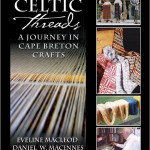 Delighted that the journal Ethnologies is getting caught up with book reviews this month (Ethnologies 36 (1-2)), because three CBUP books are included: Bearing the People Away and French Taste in Atlantic Canada and Celtic Threads.
Delighted that the journal Ethnologies is getting caught up with book reviews this month (Ethnologies 36 (1-2)), because three CBUP books are included: Bearing the People Away and French Taste in Atlantic Canada and Celtic Threads.
Of Celtic Threads: A Journey in Cape Breton Crafts, by Eveline MacLeod and Daniel W. MacInnes (CBUP 2014), the reviewer writes:
“Celtic Threads is unique in the small body of literature that examines the history of weaving in the Gaelic Cape Breton tradition. Most of the seminal books on weaving in Cape Breton … examine patterns, equipment, and materials used in weaving. Eveline MacLeod and Daniel MacInnes, however, take a different approach. Celtic Threads focuses on the weavers who introduced the traditions that still survive in Cape Breton in an attempt to recognize the craftspeople too often ignored in the study of material culture. This is not surprising, given that MacLeod was herself a weaver who practiced and studied the tradition for more than sixty years.
“In Celtic Threads, weaving is linked to the very survival of the Gaels in Cape Breton. Rather than being a hobby, weaving was a subsistence practice which enabled them to create winter clothing and keep warm in the harsh climate. MacLeod and MacInnes note that while weaving might have provided an opportunity for individual expression, its foremost goal was to ensure the survival of the early settlers.
“[T]he book will serve as the foundation for future work on the weavers of Cape Breton and their traditions. Future generations will use Celtic Threads: A Journey in Cape Breton Crafts as a springboard for continued research on gender roles, heritage crafts, and settler life.”
Delighted that the journal Ethnologies is getting caught up with book reviews this month (Ethnologies 36 (1-2)), because three CBUP… Continue»
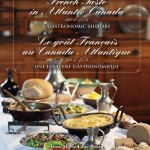 Delighted that the journal Ethnologies is getting caught up with book reviews this month (Ethnologies 36 (1-2)), because three CBUP books are included: Celtic Threads, Bearing the People Away and French Taste in Atlantic Canada.
Delighted that the journal Ethnologies is getting caught up with book reviews this month (Ethnologies 36 (1-2)), because three CBUP books are included: Celtic Threads, Bearing the People Away and French Taste in Atlantic Canada.
Of French Taste in Atlantic Canada – 1604-1758: A Gastronomic History / Le goût Français au Canada Atlantique 1604-1758 : Une Histoire Gastronomique, by Anne Marie Lane Jonah and Chantal Véchambre (CBUP 2012), the reviewer writes:
“Jonah and Véchambre’s book is an excellent example of how a book can be part historical research and part cookbook: the authors are able to retain the interest of the reader, yet it is not too disjointed as to interrupt the flow of the text.
“Following the accounts of the lives of some of the first French settlers of Cape Breton was a wonderful way in which to bridge the gap between recipes and history.The level of detail used to describe these lives is extraordinary, and really adds to the book.
“French Taste in Atlantic Canada … is an informative and detailed examination of Acadian and Louisbourg foodways, with no glaring omissions or gaps in the history … in an accessible manner, which makes the book appeal to many different audiences, whether a historian, a student, or a home cook. I appreciated the chapter layout of the book (laid out by history and meals), and while the recipes are good, the real strength of this book is how the writers were able to bring history and personal accounts together to show the contemporary reader the importance of food in the building of French colonies in Atlantic Canada.”
French Taste in Atlantic Canada won an Atlantic Book Award in 2013.
Delighted that the journal Ethnologies is getting caught up with book reviews this month (Ethnologies 36 (1-2)), because three CBUP… Continue»
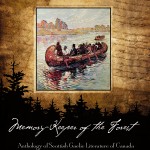 Our visit with Prof. Rob Dunbar, during his recent visit to the CSANA conference in Antigonish (May 5-7, 2016) reminded us that we had not yet posted his warm review of Michael Newton’s Seanchaidh na Coille / Memory Keeper of the Forest: Anthology of Scottish Gaelic Writing of Canada.
Our visit with Prof. Rob Dunbar, during his recent visit to the CSANA conference in Antigonish (May 5-7, 2016) reminded us that we had not yet posted his warm review of Michael Newton’s Seanchaidh na Coille / Memory Keeper of the Forest: Anthology of Scottish Gaelic Writing of Canada.
An Comunn Gàidhealach Ameireaganach / The American Gaelic Society’s newsletter, An Naidheachd Againne (literally, “Our News” or “Our Stories”) is for “members only” for two years, but we are pleased to post excerpts from Prof. Dunbar’s review below.
Editor-in-Chief Mike Hunter attended some of the CSANA conference and pleased to note just how many times Michael Newton’s and many other CBU Press books were cited in the papers presented.
Seanchaidh was of course shortlisted for an Atlantic Book Award (April 27, 2016) and, during the week-long book awards festival, Michael and Lewis MacKinnon toured (Sydney, Halifax and Charlottetown) a program of excerpts from the book.
This past winter, the book was also praised by Scots-Gaelic journalist Roddy MacLean, of Inverness (Scotland), in his Inverness Courier column: “Am Peursa.” Michael provides a translation from the Gaelic on his blog “The Virtual Gael” at http://tinyurl.com/zzlamk8.
~~
An Naidheachd Againne, Spring 2016, Volume XXXII (1): 9-11.
“In 1901, there were more than 90,000 Gaelic speakers to be found in Canada, meaning that Gaelic was the fourth most widely spoken language in the country at the time. Although more than half of those were apparently in Nova Scotia, Jonathan Dembling’s valuable research shows that Gaelic speakers were to be found in every province. Thanks to Dr. Michael Newton’s excellent book, we are now able to hear what those Gaels had to say in their own words.
“Dr. Newton … is trying to give us a perspective on the life and the opinions of the Gaels, in their own words, from all over Canada…. In this effort, Dr. Newton has been exceptionally successful.
“In Seanchaidh na Coille, [Newton] has once again found many a pearl, in journals and newspapers which have long since disappeared, and in other rare sources […] jewels that will not be found elsewhere, I don’t believe, in any library or archive. In addition to his research and interpretive skills, Dr. Newton has a flair for translation: The English versions are loyal to the original texts, but have an artful flavour to them.
“The book gives us a broad perspective on the life of the Gaels in Canada. As would be expected, there is plenty in it about the cultural, social, and political situation of the Gaels in Scotland before they left, and on emigration, and on settlement. But there are substantial chapters on topics such as love and death, religious belief, the situation of Gaelic in the Gaelic communities, cultural initiatives, and politics of the new country. There are many surprises to be found, such as two song-poems in the chapter on religious belief. In the song-poem ‘The Dissemination of the Scriptures’, James MacGregor, a Minister of the Presbyterian Church, is critical of aspects of the cultural heritage of the Gaels, but, surprisingly, he expressed his views skilfully and artfully in poetry that is very traditional with respect to metre and expression. As Dr. Newton himself explains, composers of spiritual verse would set their poetry to traditional secular song airs, but not often in the form of a waulking song, and yet this is what we have in ‘That is the Drink I would Imbibe’.
“In spite of the breadth and diversity of the collection, I would say that there is a concept which runs through it like a golden thread or, if one would prefer it, the ground movement in a pibroch, and that is the impact of the powerful culture — that is Anglophone culture — and the institutions of that culture on the Gaels. Through the literature itself and through Dr. Newton’s skilful and perceptive explanations, the mechanisms are clearly seen by which language shift and cultural dispossession work to the detriment of a minority such as the Gaels.
“[T]his is an excellent book. It will be of great utility to anyone interested in the literature of the Gaels, or in the literature of Canada, in social history, and in cultural relations, and nobody now has an excuse for being ignorant of the literary legacy of Canadian Gaels. For that, and for Dr. Newton’s praiseworthy work, we should all be thankful. I would greatly recommend this book.”
=30=
Our visit with Prof. Rob Dunbar, during his recent visit to the CSANA conference in Antigonish (May 5-7, 2016) reminded… Continue»
 Good luck to shortlisted author Michael Newton, whose Seanchaidh ne Coille – Memory Keeper of the Forest: Anthology of Scottish Gaelic Literature of Canada (CBUP 2015) is up for the Atlantic Book Award for Scholarly Writing this evening in Moncton, NB (April 27, 2016).
Good luck to shortlisted author Michael Newton, whose Seanchaidh ne Coille – Memory Keeper of the Forest: Anthology of Scottish Gaelic Literature of Canada (CBUP 2015) is up for the Atlantic Book Award for Scholarly Writing this evening in Moncton, NB (April 27, 2016).
Memory Keepers was featured at three book festival events earlier this week (April 24, 25, 26), with a performance of excerpts along with Nova Scotia poet Lewis MacKinnon (Rudan Mì-bheanailteach is an Cothroman, CBUP 2014), in Sydney, Halifax and Charlottetown.
Michael was interviewed on CTV Morning Live on April 25 (link to the piece here 4:42) and on CBC Mainstreet PEI just before the show in Charlottetown. We hope to have a link to the interview.
Oh, and, congratulations and best of luck to those other thirty-odd books shortlisted for Atlantic Book Awards tonight.
Good luck to shortlisted author Michael Newton, whose Seanchaidh ne Coille – Memory Keeper of the Forest: Anthology of Scottish Gaelic… Continue»
We are thrilled to confirm that Atlantic Book Award finalist Michael Newton (Seanchaidh na Coille / Memory-Keeper of the Forest: Anthology of Scottish Gaelic Writing of Canada, CBU Press 2015) will be featured during the awards festival next week in Sydney, Halifax and Charlottetown.
Now in its second printing, Seanchaidh na Coille edited by Michael Newton, is shortlisted for the Atlantic Book Award for Scholarly Writing. The awards will take place April 27 in Moncton
During Atlantic Book Awards festival week, Newton will give a series of free public readings and performances from Seanchaidh na Coille, along with Nova Scotia Gaelic poet and singer Lewis MacKinnon (Famhair and Rudan Mì-bheanailteach is an Cothroman): in Sydney, 2 p.m. April 24, at the Centre for Social Innovation, 32 Nepean St.; in Halifax, 7 p.m. April 25, at The Company House, 2202 Gottingen St.; in Charlottetown, 7 p.m. April 26, at the Benevolent Irish Society, 582 North River Road.
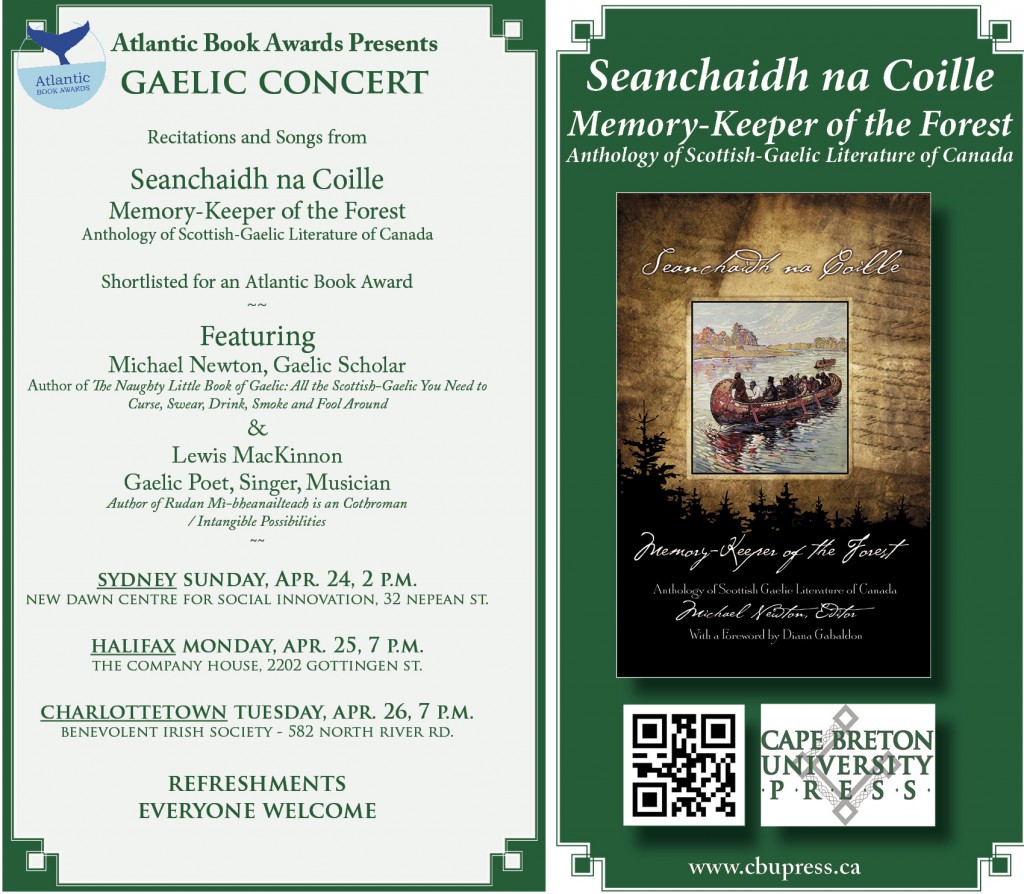
We are thrilled to confirm that Atlantic Book Award finalist Michael Newton (Seanchaidh na Coille / Memory-Keeper of the Forest:… Continue»
 The latest edition (March 30) of the Journal of Folklore Research: An International Journey of Folklore and Ethnomusicology includes a review of The Oak Island Mystery Solved, by Joy A. Steel (CBU Press 2015). And what a review!
The latest edition (March 30) of the Journal of Folklore Research: An International Journey of Folklore and Ethnomusicology includes a review of The Oak Island Mystery Solved, by Joy A. Steel (CBU Press 2015). And what a review!
Normally reserved for reviews of scholarly books, JFR reports that, overall, “the book is an enjoyable read. The prose is straightforward and almost conversational. [It] may be of interest to folklorists due to its focus on the interplay of legend and history. If nothing else, folklorists will appreciate Steele’s contention that in many ways the true treasure of Oak Island is the legend and history surrounding the island’s mysterious features.
“…this book definitely highlights the power of legend and its ties to history and tourism,” it says, and “it is in the outlining of the solution [of the mystery] that the book shines.”
The truth s out there!
Link to the full review here: http://www.jfr.indiana.edu/review.php?id=1906
The latest edition (March 30) of the Journal of Folklore Research: An International Journey of Folklore and Ethnomusicology includes a… Continue»